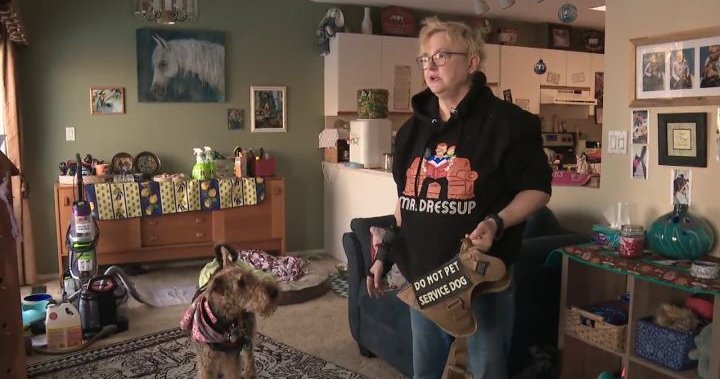A woman says she is filing a complaint with the Alberta Human Rights Commission against a taxi company, saying its drivers denied multiple rides to her and her service dog in Leduc, Alta., last month.
“It feels like I’m being discriminated against because I have a disability and I have a service dog,” Karen Almond told Global News on Friday. “It feels like a slap in the face.
“It feels awful. It feels like you’re no longer a human being.”
READ MORE: Alberta group helps provide service dogs for veterans and first responders
Almond alleges the incidents occurred on Dec. 5 and two more on Dec. 23. She said they all involved Sunrise Cabs and that she called them even after being denied service because she assumed another driver may give her a ride.
“I had a broken wrist, I had a lot of heavy groceries,” she said of one of the incidents.
“There’s no way I could get home without a taxi.”
She said in that instance, she told the dispatcher when she called that she has a service dog and that she had certification to prove that. Almond added that her dog has an official service dog vest.
She said she was told the company will give rides to service dogs but when the driver arrived he would not drive her with her dog Burnley. She said she told the driver the dog is not a pet and then he cursed at her before driving away.
“So I went back inside (the grocery store) in tears,” Almond recalled, noting a couple saw what happened and gave her and her dog a ride home with their groceries.
Global News spoke to a representative with Sunrise Cabs by phone on Friday. He declined an interview request but said the company does give rides to service dogs and was not sure what happened in the events described by Almond.
Almond said she felt compelled to reach out with her story after seeing the story of another woman on Global News last month who said she had difficulty getting a ride with her service dog in Edmonton.
WATCH: Edmonton woman and service dog get stuck waiting for ride
Greg McMeekin, the province of Alberta’s advocate for persons with disabilities, said his office has received an “uptick” of similar reports.
“It’s becoming more prevalent in the last few weeks,” he said Friday. “It’s becoming more and more of an issue.
“I think it has to do with general awareness and confusion. I’m not sure if people are aware of the Service Dogs Act in Alberta which allows people who use the services of a service dog to access everywhere basically.”
McMeekin said he is disappointed to hear of such stories.
“What our office is able to do is educate and support and provide information to Albertans,” he said. “As far as next steps, that would be up to the individual to decide what to do next. But generally speaking it’s disappointing.
“By not providing the service, you’re not only not following the (Service Dogs) Act, but you are also potentially putting both the person and the service dog at risk, and nobody wants to see that.”
When asked about the increased number of people reporting being unable to get rides with their service dogs, a spokesperson for the province said the government is “committed to ensuring all Albertans have access to accessible transportation in their communities.”
“Albertans with disabilities who use a qualified service dog have guaranteed public access rights under the Service Dogs Act and must be allowed access to any location where the general public is allowed,” Lisa Shankaruk wrote in an email. “A taxi driver unable to transport an individual and their service dog can order another taxi from the company, requesting a priority response be provided.
“Businesses discriminating against qualified service dog teams are liable to a fine up to $3,000. To report an offence, individuals can file a report on the alberta.ca website or contact their local authorities.”
“There are two issues at play here: the issue of individuals with service animals not being able to access services, however, there is also a large issue of accessible transportation… across the province,” McMeekin said. “That continues to be an issue and that speaks to the need for broader, both Alberta legislation dealing with accessibility and also an enhancement of the existing (Accessible Canada Act)… which deals with everything under federal jurisdiction.”
READ MORE: Liberals vow to evaluate existing, future policies with disability lens
“I feel very badly about these stories because I’ve experienced them myself in the past, and all you can do is either advocate for yourself at the time or make alternative arrangements.”
McMeekin said his office has a strategic plan to further address accessibility issues in Alberta and that he hopes there will be “meaningful progress within the calendar year.”
He added that challenges with regard to people with disabilities being able to access transportation are particularly evident in more rural areas.
Almond said Burnley is able to detect low blood pressure and seizures.
“He saved my life four times already,” she said. “He’s my family. He’s my service dog. He has helped me immensely.”
–With files from Sarah Komadina, Global News
© 2023 Global News, a division of Corus Entertainment Inc.





